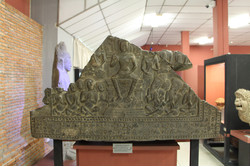Artwork Search
Arts in Southeast Asia Database
Connecting block
Keywords : Buddha image, Dharmacakra, The National Museum Phra Pratom Chedi
| Site common name | Phrapathom Chedi National Museum |
|---|---|
| Type of artwork | Sculpture |
| Sub district | Phra Pathom Chedi |
| District | Mueang Nakhon Pathom |
| Province | Nakhon Pathom |
| Region | Central |
| Country | Thailand |
| Geographic Coordinates Decimal degree | Lat : 13.818427 Long : 100.060937 |
| Geographic Coordinates UTM | Zone : 47 P Hemisphere : N E : 614666.73 N : 1527898.98 |
| Place of artwork | In the exhibition hall |
| History of production | The exact age of the base is unknown, but its characteristics can be convincingly dated back to the Dvaravati period. |
|---|---|
| Size | Height 60 cm; width 111 cm. |
| Art | The connecting block is utterly ruined. Made of stone, the connecting block is a square hunk of stone with a through hole in the middle and serves to connect the Dharmacakra to the pillar. The four sides of the block depict the First Sermon and are in s state of disrepair. Only one side gives details adequate for studying. The Buddha is seated in the European style on the throne, his right hand is showing preaching gesture, and his left hand is placed on the lap. Five Brahmins sitting below on the left hand side of the Buddha might possibly represent the Five Disciples before Buddhist ordination; while, on the right side, five Buddhist monks are sitting there, convincingly considered as the Five Disciples after entering monkhood. The figures right behind the Five Disciples on both sides could be deities and the Brahma devas. |
| Key academic information | The connecting .block depicting the Buddha’s First Sermon is a great masterpiece of Dvaravati art. It showcases the superb craftsmanship and also shows that the people of Dvaravati clearly saw the connection between Dharmacakras and the First Sermon. |
| Notice | The faces of the Five Disciples before and after entering monkhood are distinctly different, that is, before Buddhist ordination, they look gloomy, i.e. having protuberant eyes, frowning eyebrows, and lips pressed together. On the other hand, becoming monks, their eyes are looking down towards the floor, and, with the monobrow, they’re wearing a thin smile. This might be the artist’s attempts to express the Eye of Wisdom, namely the deep delight at enlightenment on Dharma. |
| Period | Historical Period |
| Art period | Dvaravati |
| Age | 12th -16th centuries BE. |
| Religion | Buddhism |
| Sect | Theravada |
| Religion and belief | Theravada |
| Type of License | Attribution-NonCommercial-NoDerivs (CC BY-NC-ND) |
|---|---|
| Rights | Princess Maha Chakri Sirindhorn Anthropology Centre |
| Date of record creation | 2015-08-19 |
| Record creator | Rungroj Thamrungraeng |
| Bibliography | ธนิต อยู่โพธิ์, ธรรมจักร. กรุงเทพฯ : กรมศิลปากร, 2508. ผาสุข อินทราวุธ, ทวารวดี การศึกษาเชิงวิเคราะห์จากหลักฐานทางโบราณคดี. กรุงเทพฯ : อักษรสมัย, 2542. ศักดิ์ชัย สายสิงห์, ศิลปะทวารวดี วัฒนธรรมพุทธศาสนายุคแรกเริ่มในดินแดนไทย. กรุงเทพฯ : เมืองโบราณ, 2547. สรัญญา สุริยรัตนกร และคณะ, พิพิธภํณฑสถานแห่งชาติ พระปฐมเจดีย์. กรุงเทพฯ : กรมศิลปากร, 2542. |


